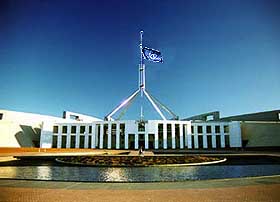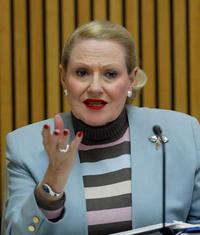 I attended the National Forum on Australia's Christian Heritage at Parliament House, Canberra on Monday and Tuesday. I was hoping it would not be a flag waving "let's take the nation for Jesus!" type of exercise and I'm glad to say it wasn't. Stuart Piggin, the principal organiser, made a helpful distinction between Australia as a "Christian nation" which it certainly is not, and Australia as a "Christianised" nation, which is just as certainly is. There was a wide cross section of views represented, with speakers and delegates drawn from across the denominational and theological spectrum and politicians from both the left and the right. Kevin Rudd, Labor Shadow Minister for Foreign Affairs spoke about the Christian origins of the Australian Labor Party and spoke eloquently of the need for Christians to play their part in a pluralist society. The event confirmed my suspicions that recent concerns about an American-style take over by the "Religious Right" in Australia are often superficial and not suitably nuanced about the nature of "Christian Australia." (Michael Ashby's review of Dennis Altman's essayThe 51st State in the latest Eureka Street is worth a look). The fact is that Christian Australia is not exclusivley "right wing" nor even exclusively "evangelical." Though there were occasional cringe-worthy moments - such as when the photographer Ken Duncan criticised Aboriginal land rights as creating an apartheid system (!)- most speakers were moderate voices from a broad range of Christian traditions calling for the importance of celebrating and remembering Australia's Christian past and present.
I attended the National Forum on Australia's Christian Heritage at Parliament House, Canberra on Monday and Tuesday. I was hoping it would not be a flag waving "let's take the nation for Jesus!" type of exercise and I'm glad to say it wasn't. Stuart Piggin, the principal organiser, made a helpful distinction between Australia as a "Christian nation" which it certainly is not, and Australia as a "Christianised" nation, which is just as certainly is. There was a wide cross section of views represented, with speakers and delegates drawn from across the denominational and theological spectrum and politicians from both the left and the right. Kevin Rudd, Labor Shadow Minister for Foreign Affairs spoke about the Christian origins of the Australian Labor Party and spoke eloquently of the need for Christians to play their part in a pluralist society. The event confirmed my suspicions that recent concerns about an American-style take over by the "Religious Right" in Australia are often superficial and not suitably nuanced about the nature of "Christian Australia." (Michael Ashby's review of Dennis Altman's essayThe 51st State in the latest Eureka Street is worth a look). The fact is that Christian Australia is not exclusivley "right wing" nor even exclusively "evangelical." Though there were occasional cringe-worthy moments - such as when the photographer Ken Duncan criticised Aboriginal land rights as creating an apartheid system (!)- most speakers were moderate voices from a broad range of Christian traditions calling for the importance of celebrating and remembering Australia's Christian past and present. Public discourse is an interesting thing to observe and learning how to speak "Christianly" in public is a skill in all too short supply. Robert Jenson says that “theology is the thinking internal to the task of speaking the Gospel" (Systematic Theology I:5), which is another way of saying we should think before we speak. Theology is always an act of interpretation because it hears the old word of the Gospel and it speaks that word afresh in a new context. We have heard the Gospel spoken to us; we must now ask what we should say and do so that the Gospel may be spoken again. The logical form of theology includes such statements as “To be speaking the Gospel say x rather than y.” Paul says “To be saying the Gospel say “Jesus is Lord” rather than “Jesus is cursed.” The church exerts her teaching authority when she says, “If you claim to speak for this community say ‘the eternal Son of God was made flesh in Jesus Christ,’ rather than ‘Jesus was only a Galilean peasant rabbi.’” It is the church’s dogmatic task to determine which statements about God speak the Gospel and which do not. The church is that community “which speaks Christianese” and a sentence like “Jesus is Lord” is a properly made sentence according to the grammar of orthodoxy. “God helps those who help themselves” is not very good Christian. "I can do nothing without God’s help” is better. Dogmatic (as distinct from doctrinal) statements emerge once the church has said “To be speaking the Gospel we must henceforth say ‘x’ rather than that other possibility ‘y’,” there can be no going back. Such a dogmatic choice irrevocably determines the future of the church. I remember Jim Ridgway when I took Systematic Theology as an undergraduate student saying, “You can say you don’t believe in the Trinity if you want to, so long as you realise that when you say that you place yourself outside of the church.”
 During the Forum, Bronwyn Bishop, Federal Member for Mackellar, was responding to a paper given by Professor Robert Linder, who had given an address in which he had referred to an early Australian Trade Union leader as a Christian Socialist. This was too much for Ms. Bishop who insisted in her reply that there was no such thing as Christian Socialism. A socialist could be a Christian but the word “socialist” could never be used as an adjective to modify the noun “Christian.” The reason she gave for this was that the focus on Christianity is on the needs of the individual rather than on the needs of the group. Now this seemed to me and to many others not to be speaking very good Christian at all. She had also confidently asserted, in challenging religious pluralism, “My Bible says that Jesus said ‘I am the Way the Truth and the Light.’” [rather than the “Life.”) Another speaker had urged us never to forget “Sampson and his donkey” (!) These are forgivable errors. They are either slips of the tongue or minor misquotes. But to understand Christianity as entirely about the needs of individuals and to have therefore little to say about social needs or collective concerns seems to me to be speaking very bad Christian indeed. At least one other delegate must have felt the same as he called out “The Honourable Member’s time has elapsed!” This was the only genuinely discourteous, even if perceptive, moment at the forum.
During the Forum, Bronwyn Bishop, Federal Member for Mackellar, was responding to a paper given by Professor Robert Linder, who had given an address in which he had referred to an early Australian Trade Union leader as a Christian Socialist. This was too much for Ms. Bishop who insisted in her reply that there was no such thing as Christian Socialism. A socialist could be a Christian but the word “socialist” could never be used as an adjective to modify the noun “Christian.” The reason she gave for this was that the focus on Christianity is on the needs of the individual rather than on the needs of the group. Now this seemed to me and to many others not to be speaking very good Christian at all. She had also confidently asserted, in challenging religious pluralism, “My Bible says that Jesus said ‘I am the Way the Truth and the Light.’” [rather than the “Life.”) Another speaker had urged us never to forget “Sampson and his donkey” (!) These are forgivable errors. They are either slips of the tongue or minor misquotes. But to understand Christianity as entirely about the needs of individuals and to have therefore little to say about social needs or collective concerns seems to me to be speaking very bad Christian indeed. At least one other delegate must have felt the same as he called out “The Honourable Member’s time has elapsed!” This was the only genuinely discourteous, even if perceptive, moment at the forum.Parliament resumed the day after the Forum and Mr. Howard now finds himself embattled with even his own coalition back benchers who have rejected his proposed "Migration Amendment (Designated Unauthorised Arrivals) Bill" as draconian and regressive and seem likely to vote against the Bill with the Opposition. It seeks to amend the Migration Act of 1958 by expanding the offshore processing regime so that all unauthorised arrivals, including mainland arrivals, are processed offshore in detention centres. This will inevitably mean children in jails in Nauru. Do we really want to be doing that? Liberal MP Petro Georgiou in The Age today called it "the most profoundly disturbing piece of legislation I have encountered since becoming a member of parliament." To privilege border protection over the Christian grace of hospitality seems patently wrong to me. We cannot say to refugees, "You are not welcome here and if you come here we will jail you and your children" and be speaking good Christian.
With all due respect to Ken Duncan, who in person is quite a humble man, perhaps he should let his photography do the talking and refrain from making public statements on political issues in future. Can our government find a God honouring and humane way of protecting our nation's borders? It seems we haven't managed to do so yet.
ReplyDeleteWonderful writing Glen.
ReplyDeleteI very much appreciated your clarity in stating, "Theology is always an act of interpretation because it hears the old word of the Gospel and it speaks that word afresh in a new context."
And then following this up with relevant examples... what can I say?!?!
Thanks mate.
Thanks Ken. Really I owe the clarity to Robert Jenson from whom I was drawing the ideas. Glad you liked the post.
ReplyDelete